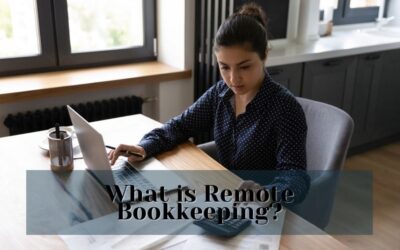Remote bookkeeping is an attractive option for small and emerging businesses in search of affordable financial management. As the name implies, remote bookkeepers work are outsourced team members who provide virtual support whenever needed and are often hired by...
Blog
3 Questions to Ask Your Business Accountant
Some say money isn’t everything, but to your accountant, your money should be EVERYTHING. An accountant can take away the stress of managing your businesses’ financials and allow you to focus that time and energy into creating additional revenue. So how do you know if...
How to Organize Invoices for Small Business Bookkeeping
If you run a small business, how are you storing your invoices? If you're like most people, they're either in a box or folder somewhere, or thrown into a digital folder. It may seem like an easy enough task to file them away, but what about when it's time to do your...
4 Business Outsourcing Opportunities to Consider
Outsourcing is the process of finding a company to perform business tasks for you. Many small businesses have found outsourcing to be an effective means of managing all facets of their business, from payroll and accounting to marketing and customer service. In this...
What Are Money Purchase Pension Plans (MPPPs)?
Regardless of if retirement is right around the corner or decades from now, it is critical that both you and your employees have a concrete plan of action in place. Have you considered offering a money purchase pension plan (MPPP) as part of your offered retirement...
Small Business Profit Sharing Plan
Profit sharing plans, also known as employer discretionary contributions, are commonly confused with a variety of other employer-provided benefits, such as 401k plans. However, they are significantly different! As a small to mid-sized business seeking to create a...
Virtual CFO Services: Why Is It a Growing Trend?
Navigating finances is often one of the most challenging aspects of owning a business. As a business owner and expert in your field, financial concerns may be burdensome. Does time spent unweaving the complexities of a budget, billing, or financial planning detract...
Remote Coaching for Accounting and Bookkeeping Tasks: Top 5 Benefits
Business owners consistently fight for increased efficiency and profitability when delegating business tasks. At times, personally taking on a task is the most effective option. Other times, outsourcing is the answer. Choosing between both paths is always a cause for...
Types of Inventory Management Reports
With many businesses ready to embrace the new year and a fresh start, now is the perfect time to organize and streamline your processes. Have you considered an efficient inventory reporting procedure? Are you in need of professional inventory reporting services?...
How to Record Daily Sales and Expenses for Your Business
While owning, operating, and overseeing a small business can be challenging in many aspects, financial management is often uniquely complex. Despite how a basic understanding of financial management and bookkeeping may bring an entrepreneur through the first stages of...
What Can a CPA Do that an Accountant Can’t?
When managing your business, navigating the financials and federal compliance can feel inundating without proper knowledge or training. When considering partnership with an outsourced financial professional, are you having a hard time distinguishing a CPA from an...
How Can a Bookkeeper Help My Business?
Owning and operating a business is just as rewarding as it can be taxing. With juggling day-to-day operations with building business strategies, it can feel inundating to remember to keep up to date with bookkeeping tasks. Are you considering the value of hiring an...











